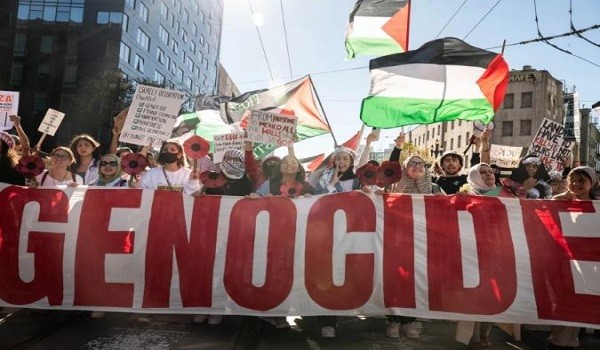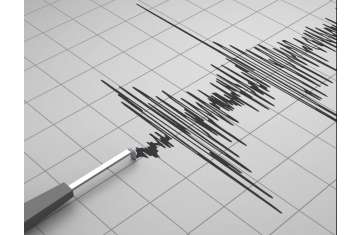The International Court of Justice, in a case brought by South Africa, ordered Israel to prevent its army from committing genocide against Palestinians, but Israel rejected the allegations
- One of the biggest problems when something like this happens is the enforcement of ICJ orders. The rulings of the Court are legally binding, but it has no direct enforcement powers.
Daniyal Khan
By a major decision reverberating throughout legal and political worlds, the International Court of Justice (ICJ) delivered a major decision on January 26, 2024, on claims of genocidal acts occurring in the Gaza Strip. According to South Africa, which has brought the case, Israel has breached Convention on the Prevention and Punishment of the Crime of Genocide 1948 through its military actions in Gaza. This lawsuit has brought the ICJ to the world’s attention, highlighting some core issues regarding the enforcement of international law, and state responsibility for the investigation of alleged mass atrocities.
Though not an assessment as to the merits of the claims of genocide, the Court’s indication of the interim measures highlights its view of the urgency of the situation and the Court’s function to prevent further potential irreparable injury. It ordered Israel to take all necessary measures to prevent further acts of genocide, provide humanitarian aid, and collect evidence of the alleged violations. The decision has been greeted with a range of reactions, some supportive, some critical, amid the entanglement of legal obligations and geopolitical considerations.
 Background of the Case
Background of the Case
On 29 December 2023, South Africa filed a case in the ICJ, alleging that Israel had been committing genocide against the Palestinian people of the Gaza Strip. The application referred to acts such as the murder of civilians, the demolition of homes, and humanitarian crises caused by blockades as proof of genocidal intent. South Africa contended that this was in breach of the Convention on the Prevention and Punishment of the Crime of Genocide 1948, to which they were both signatories.
ICJ’s Provisional Measures
On 26th January 2024, the International Court of Justice Order issued its provisional measures in the case of South Africa v. Israel in relation to the alleged violations of the Genocide Convention by the Israeli government. The Court did not conclude that genocide had taken place, but instead it constituted some of South Africa’s accusations reasonably, and therefore asked for immediate action to stop further damage.
The ICJ ruling required Israel to do whatever it could to stop acts of genocide against Palestinians in Gaza. This includes the need to take all measures to prevent its military from carrying out such acts and its individuals being subject to conduct proscribed by the said Convention.
They also said Israel should stop and punish direct and public incitement for the genocide of the Palestinian group in Gaza. The Court stressed the duty of states to prosecute any statements and acts that might be interpreted as an incitement to commit genocide. The Court also directed that Israel should take all steps to ensure the access of people in Gaza to the necessities of life, including food, water, and health care. That means making food, water, medical supplies, and other essential services accessible to the public.
In addition, Israel was also ordered to take steps to stop the destruction and to preserve all evidence concerning the commission of acts under Article II and Article III of the Genocide Convention. This is in order to keep this essential information for future processes.
The Court also requested Israel to file a report to the ICJ within one month regarding its compliance with the order. This report seeks to be a tool for transparency and accountability with respect to Israel’s treatment of the provisional measures.
These temporary measures are binding in law, and the ICJ made it clear that their implementation is urgent to prevent irreparable damage to the rights of the Palestinians in Gaza. The Court’s ruling highlights the gravity of the accusations and the urgency to act immediately in defense of the said Genocide Convention.
 Legal Significance
Legal Significance
As with most provisional measures, the ICJ’s ruling of them without jurisdiction to hear the case on the merits portrays the Court in a quasi-promotional light in international law. By recognizing that claims of genocide were arguable, the Court highlighted their gravity and the necessity for prompt measures to prevent their possible commission.
The case also serves to illustrate the ICJ‘s jurisdiction under the Genocide Convention, which permits any state party to bring a case before the ICJ against another regarding alleged breaches, regardless of its particular actions in this context. South Africa’s reliance on this provision indicates that the Convention applies to all and the shared duty to protect the people of Gaza from genocide lies on the shoulders of ICJ.
Political Reactions
There were mixed reactions to the ICJ’s decision from the international community. Some countries and groups greeted the decision as a much-needed path to accountability and upholding human rights. Still, others called the Court an overreaching institution or accused it of meddling in a complicated matter.
The allegations and the court’s order were rejected by Israel, which affirmed its right to self-defense against Hamas and denied any intention to commit genocide. Ongoing military operations were taking place, but the Israeli government said that they were attempting to reduce civilian loss of life and allow humanitarian access. But South Africa welcomed the ruling as a victory for international law because it highlighted the international community’s commitment to the prevention of genocide. The case has also enhanced South Africa’s profile as a champion of human rights and justice on the world stage.
Challenges in Enforcement
One of the biggest problems when something like this happens is the enforcement of ICJ orders. The rulings of the Court are legally binding, but it has no direct enforcement powers. It is mainly a question of political will on the part of the parties and the will of the international community to provide backing.
These provisional measures are effective if Israel complies with the Court’s decision and its implementation depends on other states’ compulsion. It highlights the capabilities of international legal institutions to pressurize powerful states to fulfill their legal obligations.
 Broader Implications
Broader Implications
The ICJ’s decision in the Israel-Gaza conflict has implications for international law and the world order at large. The move reflects a rising readiness of states to resort to legal means to raise their grievances and make others answer for their alleged abuses. It also shows the role that international legal machinery has to play in both managing and resolving the legal conflicts.
Additionally, the trials could impact other states and non-state actors by demonstrating that genocidal acts may bring international attention and accountability. Such risk-deterrent effects would support the status of the ICJ and other similar adjudicative bodies in the enforcement of international norms.
Conclusion
It is pertinent to mention that the judgment on provisional measures in the case of South Africa vs. Israel by the ICJ remains a watershed moment with regard to the use of international law in modern-day legal conflicts. The Court, at this stage, has not ruled on the allegations of genocide, but its direction of provisional measures highlights the seriousness of the situation at hand and the urgency of immediate action to prevent continued violations. The case also highlights worth and the limits of international legal procedure on geopolitical problems involving great powers. It emphasizes legal tools’ role in the promotion of accountability and the rule of law on the one hand and illustrates the difficulty of enforcing the court’s decisions against powerful states, on the other.
 DCT Abu Dhabi lists 40+ new sites under Modern Heritage Register
DCT Abu Dhabi lists 40+ new sites under Modern Heritage Register
 TRENDS panel discusses Türkiye–MENA relations
TRENDS panel discusses Türkiye–MENA relations
 UAE leaders congratulate President of Serbia on National Day
UAE leaders congratulate President of Serbia on National Day
 Cyber Security Council calls for choosing secure electronic donation methods
Cyber Security Council calls for choosing secure electronic donation methods
 Invest Bank announces over 120 scholarships to support early childhood education
Invest Bank announces over 120 scholarships to support early childhood education
 Book market lights up Sharjah Heritage Days
Book market lights up Sharjah Heritage Days
 UAE and Egyptian Presidents review bilateral ties and regional developments
UAE and Egyptian Presidents review bilateral ties and regional developments

 DCT Abu Dhabi lists 40+ new sites under Modern Heritage Register
DCT Abu Dhabi lists 40+ new sites under Modern Heritage Register
 TRENDS panel discusses Türkiye–MENA relations
TRENDS panel discusses Türkiye–MENA relations
 UAE leaders congratulate President of Serbia on National Day
UAE leaders congratulate President of Serbia on National Day
 Cyber Security Council calls for choosing secure electronic donation methods
Cyber Security Council calls for choosing secure electronic donation methods
 Invest Bank announces over 120 scholarships to support early childhood education
Invest Bank announces over 120 scholarships to support early childhood education
 Book market lights up Sharjah Heritage Days
Book market lights up Sharjah Heritage Days
 UAE and Egyptian Presidents review bilateral ties and regional developments
UAE and Egyptian Presidents review bilateral ties and regional developments




 Background of the Case
Background of the Case Legal Significance
Legal Significance Broader Implications
Broader Implications




Comments